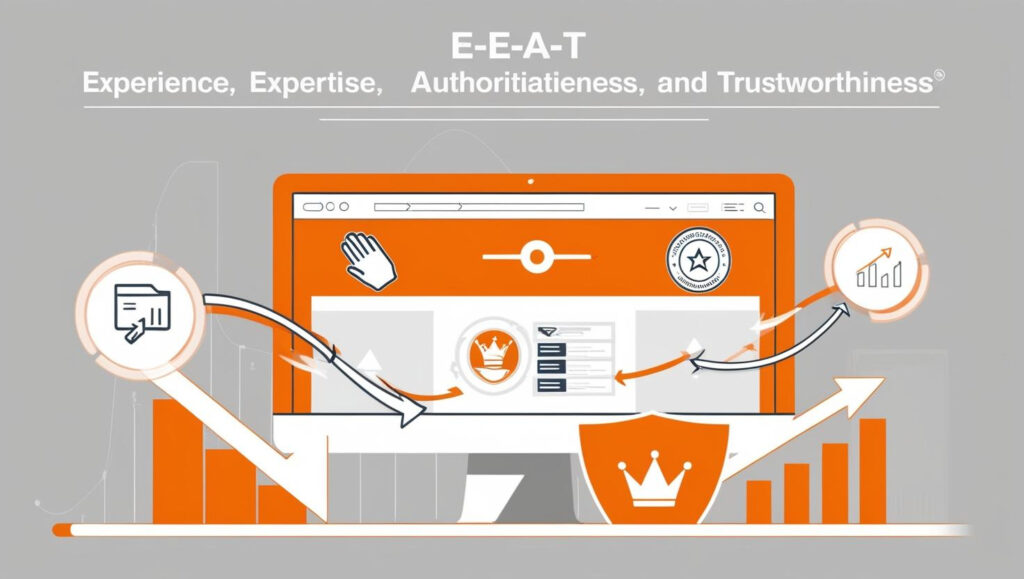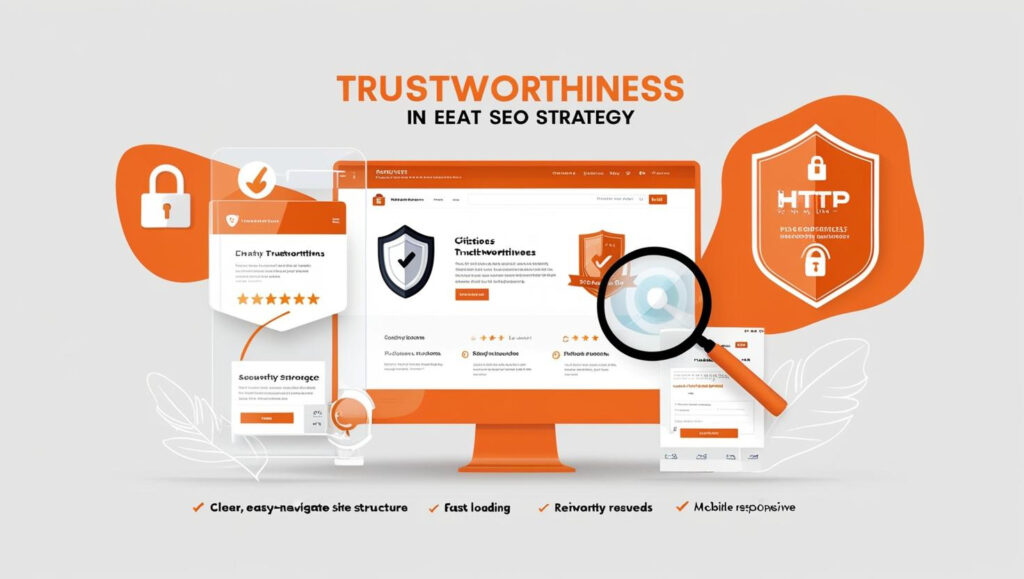In the dynamic realm of search engine optimization (SEO), staying ahead requires a nuanced understanding of Google’s ranking algorithms. Among the crucial concepts driving content evaluation is EAT: Expertise, Authoritativeness, and Trustworthiness. This framework, outlined in Google’s Search Quality Evaluator Guidelines, plays a significant role in determining the value of web content.
More recently, Google has expanded this to EEAT (Experience, Expertise, Authoritativeness, Trustworthiness) to reflect its evolving priorities. This article delves into what EEAT in SEO means, why it matters, and how you can optimize your content strategy to align with this framework.
What Is EEAT in SEO?

EEAT an acronym for Experience, Expertise, Authoritativeness, and Trustworthiness represents Google’s methodology for assessing the credibility and relevance of content. Introduced to ensure that high-quality, accurate, and reliable information ranks well, this concept is vital for content creators, businesses, and SEO professionals aiming to succeed in search engine rankings.
Each component of EEAT for SEO plays a specific role:
- Experience – Demonstrates firsthand knowledge or personal involvement in the subject matter.
- Expertise – Indicates a depth of knowledge or proficiency in a specific field.
- Authoritativeness – Reflects the recognition and credibility of the author or organization in the industry.
- Trustworthiness – Ensures reliability and truthfulness of the content and its source.
While expertise and authoritativeness focus on demonstrating knowledge and reputation, trustworthiness emphasizes reliability, particularly for sensitive topics like health, finance, or legal advice.
Why EEAT SEO Is Crucial?
Google’s primary mission is to deliver the most relevant and trustworthy information to its users. With the surge of low-quality and misleading content online, EEAT in SEO acts as a benchmark for content evaluation, especially for Your Money or Your Life (YMYL) topics subjects that significantly impact readers’ well-being, finances, or safety.
Key reasons why EEAT SEO Google prioritizes this framework include:
- User Satisfaction: Content that aligns with EEAT guidelines tends to meet user needs effectively, resulting in lower bounce rates and higher engagement.
- Content Credibility: Demonstrating EEAT enhances user trust, leading to better brand loyalty and authority in the niche.
- Algorithm Alignment: Adhering to EEAT principles aligns your content strategy with Google’s ranking algorithms, boosting organic visibility.
Implementing EEAT for SEO Success
To leverage EEAT SEO effectively, content creators and website owners must adopt strategies that highlight Experience, Expertise, Authoritativeness, and Trustworthiness. Below is a comprehensive guide to achieving this through detailed and actionable steps.
1. Showcasing Experience in Content

Google places a strong emphasis on experience, underlining the importance of firsthand knowledge or personal involvement in the subject matter. Demonstrating experience within your content builds trust with users. One effective way to showcase experience is by sharing personal stories or case studies, which can make your content more relatable and authentic.
Including real-life examples not only engages the reader but also demonstrates that the content comes from lived experience. Visual proof, such as images or videos, can further validate your claims, making them more compelling. Another way to highlight experience is by creating detailed author bios that showcase the qualifications and personal experience of the writer.
By attributing specific sections of content to experts, you emphasize the depth of knowledge behind the material. Additionally, back up your claims with data and metrics, like statistics or research findings. Ensure that the data you present is from credible and up-to-date sources to reinforce the trustworthiness of your content.
2. Building Expertise in Content Creation

Expertise is the backbone of any high-quality content strategy. Google evaluates whether the author or organization possesses sufficient knowledge about a given topic. To build expertise, it is essential to collaborate with industry experts. Inviting subject matter experts to write or review your content enhances credibility and ensures accuracy. Including guest posts from recognized authorities can also elevate your content’s expertise and broaden its reach. Additionally, showcasing relevant certifications, degrees, or awards earned by your team builds trust and establishes authority in your field.
For example, displaying trust badges, particularly on e-commerce or service-oriented websites, assures users of the credibility of your business. Focusing on both the depth and breadth of your content is also crucial. Covering topics comprehensively addressing both basic concepts and advanced insights ensures that your content appeals to a wide range of readers. Make sure to answer frequently asked questions (FAQs) related to your niche to provide value and demonstrate thorough knowledge of the subject matter.
3. Establishing Authoritativeness

Authoritativeness indicates that your site or content is a recognized leader in its domain. To build authority, one of the key strategies is earning quality backlinks from reputable websites within your industry. Acquiring backlinks from authoritative sources signals to search engines that your website is a trusted resource. Additionally, guest blogging is an effective way to build relationships and gain credibility while also earning valuable backlinks.
Another critical aspect of building authority is growing your social proof. Showcase positive reviews, testimonials, and user-generated content on your website to reinforce your reputation. Active participation on social media platforms relevant to your audience also strengthens your authority, as it allows users to interact with your content and see how others perceive your brand.
Lastly, maintaining consistent branding across all your channels whether visual or textual helps solidify your authority. Establish a content hub with in-depth resources like whitepapers, eBooks, or comprehensive guides to position your website as an authoritative figure in your industry.
4. Enhancing Trustworthiness

Trust is the cornerstone of a successful EEAT SEO strategy. Establishing trust requires transparency, consistency, and reliability. A key aspect of building trust is ensuring website security. Using HTTPS protocols not only secures your site but also boosts user confidence, as visitors know their data is protected. Regularly updating plugins and software helps to prevent vulnerabilities that could compromise user trust. Another essential step in establishing trust is verifying the accuracy of your information.
Fact-check all your content and provide proper references to reputable sources. Linking to credible websites and including citations shows your commitment to providing reliable information. In addition, prioritize the user experience (UX) on your site. An intuitive, easy-to-navigate website structure fosters trust by making it easier for users to find what they need. Ensure that your site loads quickly and is mobile-responsive to meet user expectations, as a slow or poorly designed website can erode trust.
5. Monitoring and Updating Content

SEO and EEAT are not static practices; they require ongoing attention to remain effective. Regularly updating your content is vital for keeping it relevant and accurate. Periodic audits are essential for reviewing older content to ensure it still aligns with current best practices. If you find outdated information, broken links, or poorly performing pages, it’s important to update them to maintain your content’s effectiveness and SEO performance.
Responding to user feedback is another crucial aspect of monitoring and updating your content. By actively listening to comments and reviews, you can identify areas where your content can be improved. Addressing user concerns transparently helps build long-term trust with your audience.
Lastly, staying informed about algorithm changes is essential. SEO is constantly evolving, and keeping up with updates from search engines, particularly Google, helps you adapt your strategy accordingly. Joining SEO communities and following industry blogs can provide insights into emerging trends in EEAT SEO, allowing you to refine your approach and stay ahead of the curve.
Case Studies: Effective EEAT SEO Implementation
Examining real-world examples can offer valuable insights into how EEAT SEO principles are successfully implemented. Below, we explore two case studies that demonstrate the impact of Experience, Expertise, Authoritativeness, and Trustworthiness in driving improved search rankings and user engagement.
Case Study 1: Health Information Website
Health-related content requires a high degree of trustworthiness due to its potential impact on readers’ well-being. A prominent health information website improved its visibility and credibility by prioritizing EEAT principles:
Strategies Implemented:
- Certified Medical Authors: Articles were authored by certified medical professionals, ensuring content expertise and credibility. Each piece prominently displayed the author’s credentials, such as medical degrees or professional affiliations.
- Detailed Author Bios: Comprehensive biographies highlighted the authors’ qualifications, affiliations, and achievements, fostering transparency and trust among readers.
- External Links to Reputable Institutions: Content included citations and links to authoritative sources like government health organizations, medical journals, and research institutions.
- Regular Content Updates: The site maintained relevancy by continuously updating articles to reflect the latest medical research, guidelines, and breakthroughs.
Results Achieved:
- Significant improvements in organic search rankings for competitive health-related keywords.
- Enhanced user trust, as evidenced by increased engagement metrics such as time spent on site and lower bounce rates.
- Greater referral traffic from high-authority domains, reinforcing its position as a trusted resource in the healthcare niche.
Case Study 2: Financial Blog
Financial content, especially in the personal finance niche, demands both expertise and trustworthiness to guide readers in making critical decisions. A personal finance blog successfully established its authority and improved rankings by adhering to EEAT SEO principles:
Strategies Implemented:
- Real-Life Experiences: The blog shared detailed, relatable financial journeys and lessons, demonstrating firsthand experience in managing finances. This personal approach resonated with readers and added authenticity to the content.
- Expert Collaborations: Partnering with certified financial advisors lent credibility to the blog. Advisors reviewed and approved content to ensure accuracy and compliance with industry standards.
- Enhanced Website Security: By implementing SSL certificates, the blog ensured secure connections for its users. A transparent privacy policy further strengthened user trust.
- User-Centric Design: The blog prioritized an intuitive design and seamless navigation, encouraging users to explore additional content and services.
Results Achieved:
- Higher rankings on Google for financial topics, particularly in the “how-to” and “guides” categories.
- Increased brand recognition as an authoritative source in the personal finance niche.
- A noticeable boost in conversion rates, as trust played a significant role in encouraging readers to subscribe or use financial tools offered by the site.
Future Trends in EEAT for SEO
As EEAT SEO evolves, staying ahead of emerging trends is essential for maintaining competitiveness and meeting user expectations. These trends focus on enhancing personalization, trust, and engagement through innovative approaches.
- AI Integration: Utilize AI tools to generate personalized, data-driven content tailored to specific user needs.
- Video Content: Build trust by incorporating tutorials, testimonials, and explainer videos into your strategy.
- Interactive Content: Engage users with interactive elements like quizzes, calculators, or augmented reality (AR) experiences.
Adapting to these trends ensures your website thrives in the ever-changing digital landscape.
FAQs
1. What is EEAT SEO?
EEAT SEO stands for Experience, Expertise, Authoritativeness, and Trustworthiness, which are key factors Google uses to evaluate and rank web content. These factors help Google assess whether a website or piece of content is reliable, authoritative, and trustworthy. Content that demonstrates EEAT tends to rank higher in search engine results.
2. How do I demonstrate experience in my content for EEAT?
To demonstrate experience in your content, share personal stories, real-life case studies, and first-hand accounts. Additionally, include detailed author bios with qualifications and relevant experience. Using data, statistics, and visual proof can further validate your claims and make your content more relatable.
3. Why is expertise important for SEO?
Expertise is crucial for SEO because it shows Google that the author or organization has deep knowledge of the subject. Content that displays expertise provides accurate, valuable information, which boosts user trust and engagement. Expertise is demonstrated through high-quality writing, certifications, and collaborating with subject matter experts.
4. How do I build authority for my website?
Building authority involves acquiring high-quality backlinks from reputable websites in your industry, engaging with influencers through guest posts, and building a strong social proof foundation. Positive reviews, testimonials, and active participation in your industry help reinforce your authority, signaling to Google that your site is a trusted source.
5. How can I improve trustworthiness for SEO?
To improve trustworthiness, ensure your website is secure with HTTPS, provide accurate and well-researched content, and update outdated information regularly. Clear privacy policies, transparent user practices, and easy navigation also enhance the trust users place in your website.
6. How does EEAT affect my search engine ranking?
EEAT directly influences search engine rankings because Google prioritizes content that demonstrates experience, expertise, authority, and trustworthiness. High-quality, well-researched content that aligns with EEAT criteria is more likely to rank higher in search results, as it provides value and reliability to users.
7. What is the role of content updates in EEAT SEO?
Regular content updates are essential for maintaining EEAT SEO because they ensure that your information remains accurate, relevant, and trustworthy. Search engines value fresh content, especially for industries where information quickly changes, such as health or technology. Updating old posts can improve rankings and maintain trust with your audience.
8. How do I show author expertise on my website?
To showcase author expertise, include detailed author bios that list their qualifications, credentials, and experience. Link to other works or publications they’ve contributed to, and consider using author bylines for each post. Displaying industry-specific certifications and awards can further build credibility and authority.
9. How does user feedback contribute to EEAT for SEO?
User feedback, including comments, reviews, and social media engagement, is vital for demonstrating trustworthiness and authority. Addressing user concerns and responding to feedback openly can improve content quality and establish a reputation for being responsive and reliable, both of which are important for EEAT SEO.
10. How do I measure EEAT success for SEO?
You can measure EEAT success by monitoring your website’s rankings, traffic, and engagement metrics. Improved rankings for competitive keywords and increased organic traffic typically signal that your website aligns well with Google’s EEAT guidelines. Regularly auditing your content and reviewing feedback will also provide insight into areas for improvement.
Conclusion
Understanding EEAT in SEO is pivotal for creating content that ranks well and resonates with audiences. By focusing on experience, expertise, authoritativeness, and trustworthiness, businesses can align with Google’s priorities and enhance their online visibility. Whether you’re a digital marketer, content creator, or business owner, adopting an EEAT SEO approach will help you build credibility, engage users, and achieve long-term success in the digital marketplace.
Latest Posts
- Does AI Write Seo-Optimized Content 3x Faster Than Human Writers
- Does ChatGPT Generated Text Hurt Your SEO? Find Out the Truth!
- Does the Number of Elementor Containers Affect SEO? Get the Facts!
- How Do Blogs Help SEO? Learn Why It’s a Game-Changer!
- Want a Better Website? Learn How Do I Improve My Website!